by Josh Levy
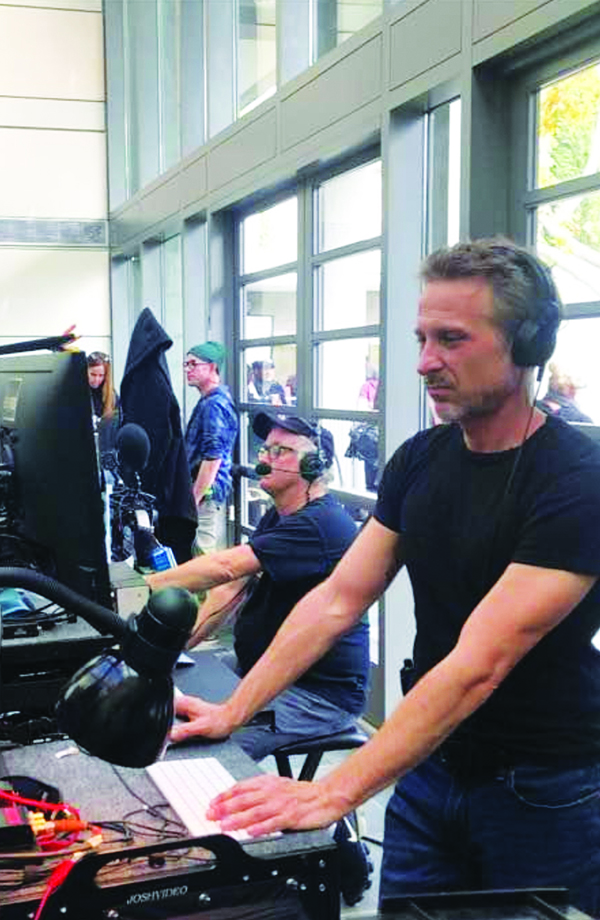
Earlier this year, I was approached by Local 695 about joining them at the upcoming AMPTP negotiations. They were looking for a member with real-life on-set experience to sit at the table and speak to the producers about why now, more than ever, we need to address additional staffing of the Video-Assist Department. My mind immediately flashed back to a conversation I recently had with Sound Mixer Steve Nelson about what actually takes place at these meetings. He told me the negotiations are actually a fairly daunting experience. When you enter the “Big” room, you see the room filled with lawyers and studio representatives all dressed in suits, staring at you face-to-face across the table as you try to get your point across.
I thought to myself, “Hmm, I think I might sit this one out.” However, this did not sit well with me. I asked myself, “What if this is the only time to really get the point across to the ‘higher- ups,’ the decision-makers, the ones that have the power to remove you from the call sheet?”
I started speaking to fellow Local 695 members; a mix of Video Operators and Sound Mixers to get their opinion on whether or not this would be worth my time. I wanted them to tell me, “You will be wasting your time; they won’t listen to you.” However, I found their responses to be anything but the answer I was expecting or hoping for.
Over the last few years, I have dedicated time and effort into forming a national video-assist group. It is a peer group of Video-Assist IATSE members across the nation with various backgrounds, personalities, and skill sets. Wonderful people who all share a common bond and share a common goal. This has been rewarding and inspiring, especially with the momentum and current gains that have been made regarding Non-Record Video-Assist. But helping unite members across the nation to become a strong voice for the issues we face is truly something I enjoy doing. I would say this is in my comfort zone. I feel at ease speaking with all the members, which is a far cry from sitting in a stuffy room across from a bunch of suit-and-tie seasoned executives who have spent a majority of their lives in professional negotiations.
Then I thought to myself, “Who has ever made a difference staying in their comfort zone?” My mind did a 180-degree turn and I knew that if I had a shot to get a message to these executives, I’d better swing as hard as I could, because I didn’t know if I would ever get up to the plate again.
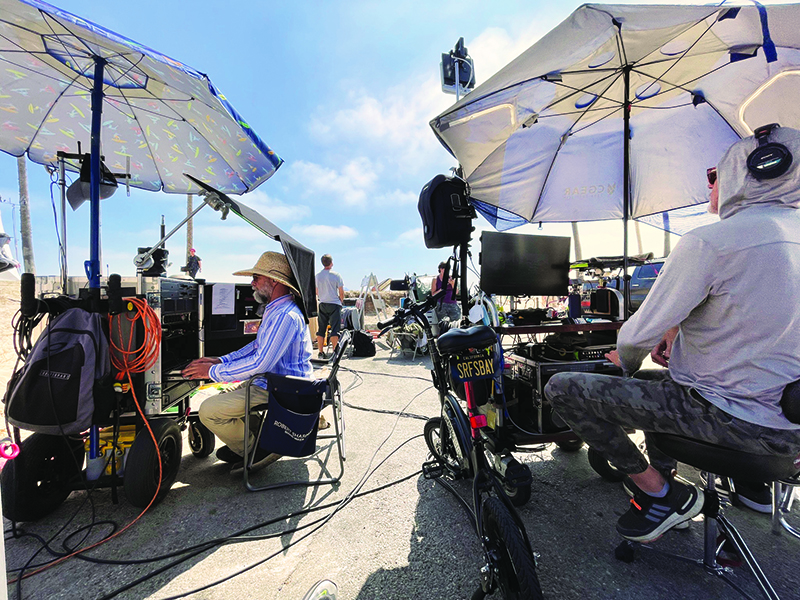
So, I said, “Yes.”
I won’t lie. With only a few days before the negotiations, I was still pretty nervous about what I was facing. I wanted to be perfect. I wanted to walk out of there with the golden ticket. I received a well-put-together PowerPoint presentation from Local 695 that showcased all the sound and video issues we wanted to discuss with the AMPTP. I could tell there was a ton of thought, time, and effort put into the presentation, but these were not my words or my thoughts. If I was going to contribute to these negotiations, I had to be able to bring my own experiences to the table. After speaking with Business Representative Scott Bernard, he assured me I would have my time on the floor to say what I needed to say. So, with forty-eight hours until the meeting, the pressure was on.
I spent the next day speaking with my National Video-Assist group partner Sam Harrison. Sam has an uncanny ability to take the thousands of words I will throw at him and narrow it down to what is really important. We settled on composing a small speech about how on a daily basis, the Video-Assist Operators are forced to work in an unsafe environment. We are frequently OVERWHELMED, both physically and mentally. After a few hours, we finalized a two-page document that listed all of our concerns and had bullet points on how the Video-Assist duties had grown exponentially with the advancement of technology. With this final draft in hand, my confidence grew. At least I had something in my hand that I could stick to; a script if you will.
But even with my script, I found myself doubting what I was about to do as I drove to the AMPTP offices. I kept thinking that what we had written was not good enough. Do they really want to hear another sob story? Am I just going to appear to be whining? Will I lose their interest? Will someone actually fall asleep during my rant? I needed a plan B; something that would stick—I need a game-changing moment.
I arrived and, once I made it through security, “I was greeted by Scott Bernard, who led me into our caucus room. My first thought was, “I am really underdressed.” Being a native of Los Angeles, I spend most my life in flip-flops and T-shirts. The closest thing I have to a suit is a collared shirt.
There were some new faces in the room, but I knew most of the members of 695’s Bargaining Committee and had even worked on set with a few of them. I knew most of them had been a part of past negotiations. Everyone appeared to be pretty relaxed. I had a nice chat with Joe Aredas and was actually beginning to relax myself when Scott said, “OK, it’s our turn to go into the big room. Let’s do this.”
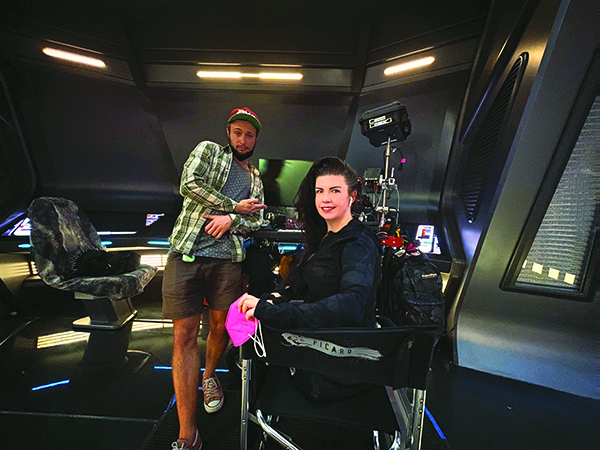
and Trainee Vadym Medvediuk

Suddenly, I was not relaxed anymore.
As we walked into the big room, I thought to myself, “Wow, this is exactly like Steve Nelson had described.”
There were lawyers and executives as far as the eye could see, all with microphones sitting in front of them. It all looked very official. We sat at a table, face-to-face with the top negotiators. Sitting center stage on the other side was none other than Carol Lombardini.
Scott opened the negotiations, got the ball rolling, and then went into the slide show. This was a lengthy presentation, with a lot of information to digest and cover. Each point on every slide was just as important as the next. Every issue needed context and evidence to support our Local’s proposals. When the presentation transitioned to the subject of video-related issues, Scott introduced me and put the ball in my court. Heads turned to my side of the table. What seemed like one thousand eyeballs turned to stare at me.
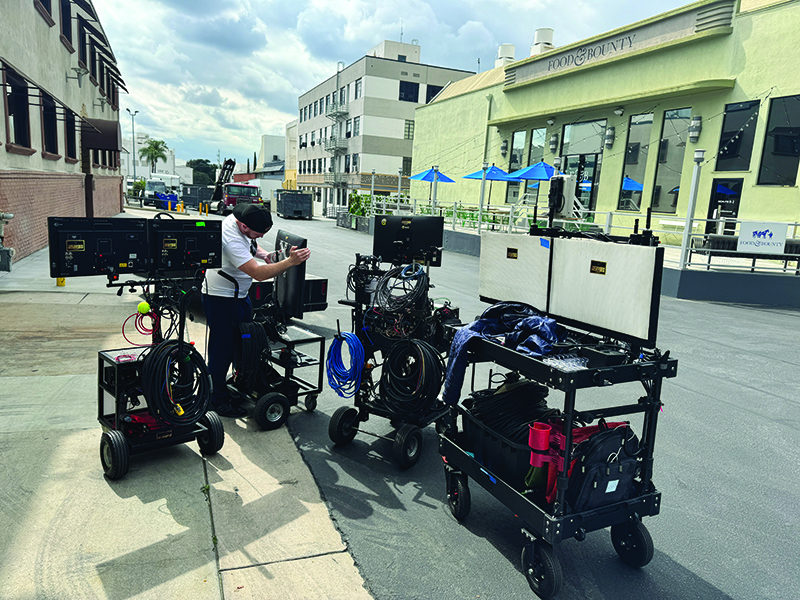
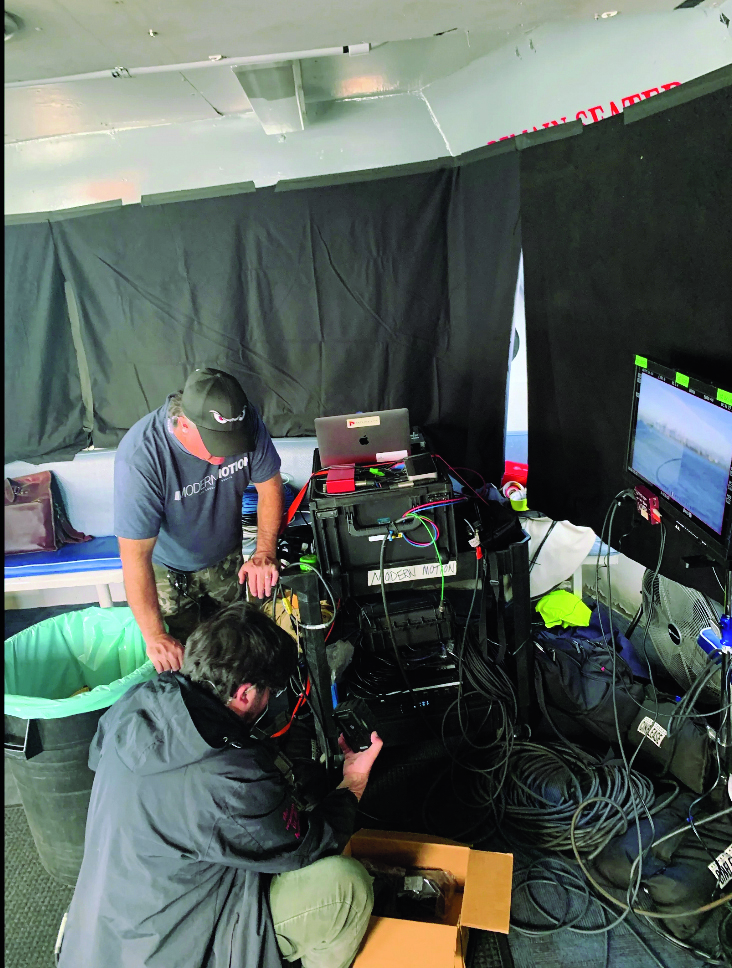
I had a choice: read my script or just go for it. I chose the latter.
“Hello everyone, thank you for having me here today. I am not sure how many of you actually have spent a lot of time on set and have seen the day-to-day work levels of a Video-Assist Operator. So let me tell you all about my last Monday.” I remember a brief moment of silence and few members from our side of the table looked over at me.
I took them through my day.
The previous Monday, I arrived on set via shuttle van to set up with no help. The sound and video trailers were three blocks from the set. The trip from the truck to set was predominantly uphill. I had fifteen hundred pounds of equipment to transport. Video-Assist was the only department with that much equipment that did not have an assistant or a utility. By myself, it took four trips to move all that gear. By 7:30 in the morning, I had already walked fifteen blocks and was falling behind schedule before the start of rehearsals. To make matters worse, we were shooting in an old, two-story house that day and, naturally, we were starting on the second floor.
So, after pushing fifteen hundred pounds of gear up hill, I had to haul a lot of it up the stairs. By the time that was done, I was drenched in sweat and before I could even catch my breath, the 1st AD comes up and asks, “How long do you need, because we are minutes away.”
I rushed and scrambled to set up, ducking and dodging around crew members having their morning conversations about their weekend and enjoying their boxed breakfast orders someone in their department had kindly delivered to set. I barely got my system up and running before I hear, “We are rolling.” I just barely managed to avoid holding up production. Luckily, my equipment booted up without a problem. If there had been any technical issues, it would have delayed the first shot of the day. In the middle of the first take, a PA frantically ran up to me and told me a producer, some writers, and the VFX supervisor watching remotely were wondering why they could not see the feed yet.
I politely said, “I am working on setting up the remote streaming system. I am by myself, I am a little overwhelmed this morning, I am working on it.”
We shot the scenes in the house. I did not have a chance to eat, drink, go to the bathroom, or take any break in five hours. I was either recording, playing back, moving, or setting up. We finished our scenes and were immediately on the move. The 1st AD screamed out to pack the trucks for a company move, but while the rest of the crew started packing and loading trucks for the next location, the director decided he wanted to watch playback of some older scenes we shot at the next location. He needed to mentally revisit the scene so he could be more prepared.
There was nothing unreasonable about this request, but I knew it was going to be a problem.
We spent ten minutes watching multiple scenes. When he was done, the director stepped into a van which ushered him off to the next location. That left me, a department of one, to move hundreds of pounds of equipment downstairs, wrap hundreds of feet of cable, pack up multiple carts, push them one at a time down the three blocks I’d pushed them that morning, and load them into the equipment trucks. The entire crew had already packed up and left. I was alone, overwhelmed mentally, spent physically, and it was not even lunch yet … on Monday.
The worst part was that I had requested help from production and was denied. In the negotiating room, I explained that I felt that this put a liability on production if I was injured.
There was moment of uncomfortable silence. The other side was shocked and aghast to hear of my experience. They were still staring at me. I had not lost their attention. I wondered if I had enlightened them into my day-to-day life of being a Video-Assist Operator.
A little later in the presentation, I spoke to them about the benefits the production gets when Video-Assist is on the call sheet. We can add safety to the day, we can shorten the day, we can provide resources on and off set that are essential to keep production moving forward. We can save productions money. That was a language I knew that they would understand.
I explained that in my experience, we are seen as a liability, when truly we are one of the greatest assets from the very first second of the day. Video-Assist is such a powerful tool in 2024 with no ceiling for future benefits to production.
After the presentation, we returned to the Local 695 caucus room. At this point, I had no idea how my presentation was perceived by my own people. The last thing I wanted to do was disappoint them for inviting me here or to make them second-guess my attendance. These thoughts in my head were rapidly extinguished when I received praises from all around. I do not think I will ever forget the feeling of that moment. It will remain pretty high on my list.
Of course, the goal going into the day was to get additional staffing in our department. The AMPTP came back with “at this time, we will not add any mandatory staffing.” Every local heard this same response when they asked for more staffing. Did I think I was going to come in here and get this decision in one round? While some heavyweight bouts have been decided in the first round, I knew this one had a better chance at going the distance.
However, they did agree to add the term “Video” to Paragraph 56.
Paragraph 56 is a provision in the Local 695 agreement that concerns additional staffing when conditions grow beyond the scope of one person. Previously, this paragraph only made mention of “Soundpersons.” But with these negotiations, it has now been revised to read,
“If production or equipment requirements create a condition whereby an abnormal demand is placed upon the sound or video crews, such condition shall be relieved by the addition of soundpersons or videopersons to the crew until such condition ceases to exist.”
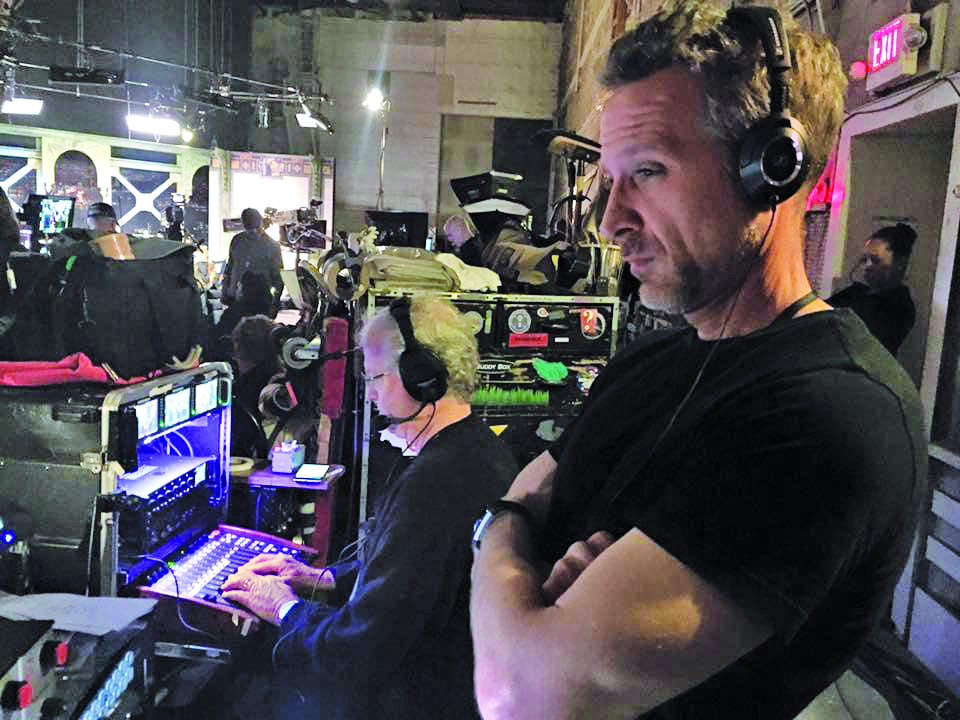
This is an important resource that clearly states, when production expectations and demands are too high or unsafe for the current staffed position, they must remedy this by adding additional members to the crew. By adding “Videopersons” in this paragraph, this means that if production is refusing to add staffing after it has been requested because of concerns over safety or excessive workload, they are violating the contract. This will make it much easier for the Local to enforce the request and need for additional staffing.
Like the long journey over the proper staffing of Non-Record Video-Assist, this too will take time to implement. The goal is for producers to add additional staffing to the budget prior to having to use Paragraph 56. During the pandemic, we were able to showcase our value to production. We broke out all the bells and whistles. They could not have done it without us. This worked in our favor at that time, especially with the producers federally funded COVID budgets which allowed us proper staffing for maybe the first time in the history of Video-Assist. We are now faced with the challenge of providing all those services, often as a solo act, as we have all been told that funding has now expired.
Fear not, as we are a resilient bunch and there is no way the membership or leadership is willing to wave the white flag on this matter. This will, like Non-Record Video-Assist, become a collaborative process between the members and the leadership.
I really feel together with constant communication, new resources like Paragraph 56 and other strategies that are on the table, we will be victorious. The next negotiation will be here before we know it, as time flies by like the landscape out the window of a moving train. EVERY Video Operator has had my last Monday. Too many of them. We deserve to be staffed properly like all other departments. We deserve safety, health, and longevity. The day should start without being overwhelmed, faced alone with so many various tasks to perform.
So, after all of this, you might ask, “Do you want to go back in to that big room with the AMPTP again? Sit face-to-face across the table and continue to fight for what is right and what is fair?”
And my answer to you would be, “How could I not?”
Thanks, that’s a wrap!
“Josh has been instrumental in protecting our Video Assist jurisdiction. In my mind, it was a no brainer to ask him to be a part of our Local bargaining committee. When he asked me what I wanted him to say, I replied, “You’re the subject matter expert. Tell them what your needs are. He owned the moment and his presentation landed. We should all be grateful for the work he has done and continues to do for our Local.”
– Scott Bernard